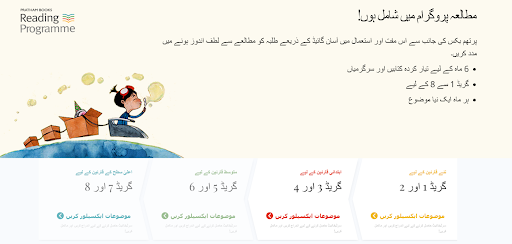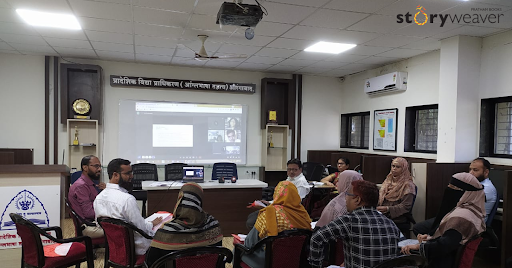Kemon achhen!
Posted by Amna Singh on August 02, 2018Team StoryWeaver was in Kolkata in June for our second Translation Hackathon (you can read all about our first one here). 15 volunteer participants, a healthy mix of teachers and language students, came together to version more than 40 stories in Bangla over one weekend. The goal of the hackathon was to facilitate not only the translation of level 1 and 2 book to Bangla, but to also ensure peer led reviews of the translations.
We reached out to Sudeshna Moitra, a language teacher with over 34 years to help us not only find and bring together enthusiastic participants, but to also facilitate the workshop and mentor the volunteers. Sudeshna Ma’am has written 'Banan Tanan' a tome used by many Bengali writers. She writes for a number of Bengali blogs, and is also the editor of Sahajpath. As a resource person in Alamin Mission she organises training workshops for teacher on language teaching.
Sudeshna Ma’am believes that “Translation of stories helps to transmit thoughts into other languages, breaking the barrier of geographical distance, religion, and culture.”
The hackathon opened with a warm introduction and Sudeshna Ma’am set the agenda for the two day hackathon. Participants were familiarized with the Pratham Books mission and the power of open licenses. Rajesh Khar, Pratham Books Editor, spoke about the nuances of translating for children, levelled readers and also exposed them to the best practices followed by our team of Language Editors. Rajesh ensured that the participants - language students and teachers working with the children from underserved communities - had much clarity to the end goal of weaving quality books that were freely accessible for the last child.

Sudeshna Moitra sets the agenda for the workshop.
“We had curated a list of stories that we wanted to see translated through the workshop. These were level 1 and 2 stories published by Pratham Books, BookDash, ASP and the StoryWeaver community. We assigned the stories to each participant before the workshop keeping in mind their particular strengths. They were asked to read each story a few times to familiarise themselves with the story and it’s nuances. But the idea was for also for them to tap into the collective learnings and energy of the group to weave their translations.” shared Amna Singh, Associate Language Editor, Pratham Books.

Participants busy translating
One of the participants, Suman Das, a Head Master Of Chalitatali Prathamik Vidyalaya of Nadia said that once the clock started ticking the participants gathered speed and completed half their allotted books before lunch. Once they had translated the stories Sudeshna Ma’am reviewed each and every story with some receiving a green signal to publish. After lunch, a discussion on the need for level appropriate words in translation was had. “Some of us, including myself used some words which weren't appropriate for the age group the stories were intended for.” shared the Head Master.

Discussions and healthy debates

Peer -to-peer review of translations

Mentoring and feedback
The next day, peer led review of stories lead to new words being included, some that were more soothing to the ear.
The hackathon was a lively space for discussion and debate: how to make translations child-friendly, keeping the words level-appropriate, importing cultural references (or not) while translating a story. This lead us to understand that a handy glossary of examples demonstrating Pratham Books’ editorial stance on translation for the last child would be helpful at our next hackathon.
It was also wonderful to see participants use robust local language keyboards which we documented to see if we could integrate the libraries into StoryWeaver.
“The workshop has provided a platform among teachers, students and translators to translate great stories in vernacular; now more children will access these stories.” Sudeshna Ma’am shared at the end of the workshop.
Participants left with plans to take StoryWeaver to their respective schools and we have already heard back from Subimal Pramanik, Assistant Primary Teacher of Swarupnagar North 24 pargonas about this.
“I have already started a new class where there is reading and learning with StoryWeaver. Students enjoyed the trial session very much and I have decided to continue with the sessions.”
We’re also very excited about a the StoryWeaver workshop that Suman Das will be conducting for 17 primary teachers from 12 schools in the Nadia district on 5th August.
Everything just came together so well over the weekend – the hunger for good stories, the energy of the language students, the wisdom of the teachers, their shared passion for Bangla. We can’t wait for our next hackathon!
You can read all the stories translated at the hackathon here.
Bhalo thakun!
comments (2)On International Mother Language Day 2023, Launching Pratham Books Reading Programme in Urdu on StoryWeaver!
Posted by Shristhi Patra on February 21, 2023On the occasion of International Mother Language Day, 2023, we launched our Urdu Digital Reading Programme in collaboration with UNICEF Maharashtra, State Council of Educational Research and Training, Maharashtra, and Regional Academic Authority, Aurangabad (RAA).
UNESCO reports that 40% of the world population does not have access to education in a language they speak or understand1. This year’s International Mother Language Day theme2 emphasises the importance of ‘promoting multilingualism and multilingual education’ in order to ‘foster quality, inclusive, and equitable learning’ for all.
We at Pratham Books Storyweaver are deeply committed to the vision of SDG 4: Quality Education for All, and to the path set out in India’s National Education Policy3 from Learning to Read to Reading to Learn. We firmly believe that learning to read in one’s mother tongue helps make education more engaging, meaningful, and enjoyable for children.

Pratham Books Reading Programme in Urdu on StoryWeaver
Pratham Books Urdu Digital Reading Programme on StoryWeaver offers open-source, high quality, digital, structured, reading resources in Urdu language to increase access to mother-language libraries and promote a culture of reading. The digital library comprises thematically diverse and grade-levelled storybooks for young learners to access freely.

RAA Aurangabad team at Pratham Books Capacity Building Workshop
These Urdu story books have been created by the partner resource team at Regional Academic Authority, Aurangabad after participating in Pratham Books StoryWeaver's capacity building workshops. These workshops included editorial translation and review capacity building training, and training for digital translation and publishing to help create level appropriate picture book translations.
References:
[1]https://en.unesco.org/news/40-don-t-access-education-language-they-understand
[2] https://en.unesco.org/sites/default/files/imld-2023-concept-note-en.pdf
[3]https://www.education.gov.in/sites/upload_files/mhrd/files/NEP_Final_English_0.pdf
New cities, new communities
Posted by Khyati Datt on December 14, 2018The excitement on the day of any StoryWeaver workshop is often mixed with some nervousness. We meet so many new people from different organisations and always want them to share the excitement we feel about books in classrooms! We wonder if the participants would connect with what we have to say and how they will react. This nervousness gets magnified when the workshop is in an all new city.
Thankfully, our wonderful community never disappoints :) Here’s an account of our last two workshops in the beautiful cities of Jaipur and Hyderabad.
We were in Jaipur during the first week of October to host a StoryWeaver workshop with educators and resource leads of various education organisations. The workshop was our first in the city and was organised with the support of Jawahar Kala Kendra (JKK). They gave us access to their stunning centre and their library -- forming the perfect venue for a workshop on the importance of reading.
We had representatives from 18 organisations across Rajasthan attending the workshop, including UNICEF, Educate Girls, OELP, Doosa Dashak and GoodWeave India. It was wonderful to host participants who had travelled from as far as Jodhpur and Bikaner. As the session progressed, we deep dived into the intriguing world of stories and explored how stories open a child’s eyes to a world filled with joy and learning.
The participants tried their hand at StoryWeaver and chose themes that they found most interesting and explored the platform for stories around them.
One of the most lively discussions was around how different kinds of books can be used with children across various age groups. One participant raised a pertinent point about the need for books in tough subjects like bullying, migration, and hunger. They also enjoyed putting on their writer’s hats and created some lovely stories on the platform.
At the end of the workshop, one of the teachers, who had come from faraway Jodhpur, told us that this was the first workshop she and her colleagues had ever attended outside their centres. This statement demonstrated the enormous responsibility that rests on us - to ensure our workshops stay relevant and productive for our teachers and educators who travel great distances putting their work and home on hold to attend our workshops.
After our first StoryWeaver workshop in Jaipur, we organised our next in the familiar city of Hyderabad. With the support of Dr. Reddy’s Foundation, the workshop saw participants from various organisations like AIF, Youth4Jobs and Youngistaan Foundation.
To celebrate the diversity of languages we have, we had a resource person, Haripriya, help us conduct some parts of the workshop in Telugu. Haripriya runs a gorgeous children’s library in Hyderabad and was a participant in our last Hyderabad workshop. Her presence not only encouraged participants to share their thoughts in Telugu, she also helped us showcase our best Telugu books.
“I thoroughly enjoyed facilitating the workshop in my mother tongue, Telugu. I had a memorable time sharing and learning from educators from different organisations who came together to understand how best they can make use of the platform in their classrooms. Together we read, created, translated books in English, Hindi and Telugu,” she remarked after the workshop.
Our team and the participants agreed that the lunch organised by Dr. Reddy’s Foundation was one of the most delicious meals we had had in a long time. Maddirala Sai Praveen from Azim Premji Foundation, a participant who has experience working with young children in anganwadi centres, volunteered to conduct an energiser post the hearty meal. That got all of us all laughing! The youngest participant of the workshop was the eight year-old daughter of a teacher in attendance and we have to say she was the most energetic of the lot!
As the year comes to a close, we would like to thank all our wonderful participants who make these workshops an amazing learning experience for us. We are also grateful to our new and potential partners, and friends of Pratham Books like Jawahar Kala Kendra and Dr. Reddy’s Foundation for their constant support.
Here is wishing our readers a Happy New ‘Reading’ Year for 2019.
If you are interested in hosting a similar workshop for your organisation, drop us an email on [email protected]
Be the first to comment.